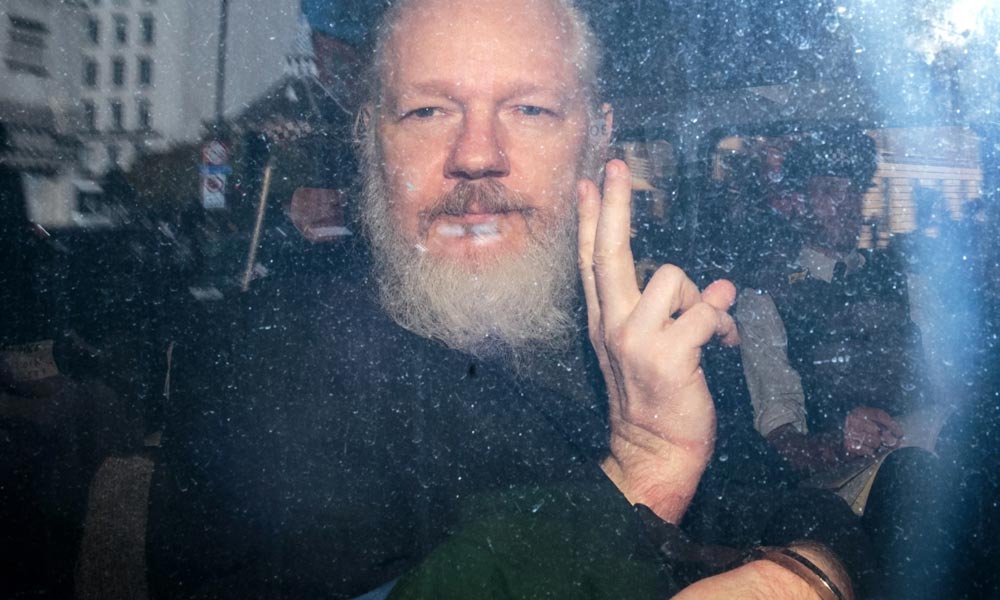It was on 11 April 2019, that the Ecuadorian authorities allowed the UK police to enter its embassy to arrest Julian Assange, an Australian journalist, computer programmer and the founder and director of WikiLeaks.
Before Assange was dragged to the outside of the embassy to where a police van was waiting for him, Assange barged past them in an attempt to return to his private room. He had to be restrained after resisting arrest and claiming “this is unlawful, I am not leaving”.
Heavily bearded and with his hair tied back, gesticulating and shouting “UK must resist”, at least six officers dragged Assange out, while more uniformed officers were outside.
The police said that the Ecuadorian authorities had invited them into the embassy, to arrest Assange in connection with his failure to surrender to the court in June 2012 for extradition to Sweden, where he faced two separate 2010 sexual assault allegations, among other things.
Ecuadorian president Lenin Moreno stated that Ecuador withdrew Assange's asylum after he repeatedly violated international conventions regarding domestic interference.
The British government was said to have been in talks with the Ecuadorian government since July 2018 to have Assange's asylum protection withdrawn.

Explaining the decision, Lenín Moreno accused Assange of interfering in the internal affairs of other countries. He said that:
The Ecuadorian ambassador to the UK, Jaime Marchan, said:
Theresa May said that she welcomed the arrest, saying that: "This goes to show that in the United Kingdom, no one is above the law."
The U.S. Department of Justice explained that one of the charges related to Assange's alleged role, is "one of the largest compromises of classified information in the history of the United States".
In contrast, Ecuador’s former president, Rafael Correa, accused his successor of being the “greatest traitor in Ecuadorian and Latin American history."
Snowden, the former U.S. government contractor wanted for leaking details of U.S. surveillance programs, called the arrest a "dark moment for press freedom". Meanwhile, actress Pamela Anderson, who was one of a diverse range of public figures and celebrities to have visited Assange during his asylum, tweeted that she was “in shock”, and accused the UK for being “America’s bitch” and of seeking a diversion "from your idiotic Brexit bullshit."
Assange's arrest has also stirred mixed reactions from other famous figures around the world, including from other politicians.
WikiLeaks' editor-in-chief Kristinn Hrafnsson said that Assange's arrest should serve as a warning to those worried about press freedom: "If they will extradite a journalist to the U.S. then no journalist will be safe. This must stop. This must end," he said.
It was in 2006 that Assange founded WikiLeaks, the international non-profit organisation that publishes secret information, news leaks, and classified media provided by anonymous sources. But it captured the world's headlines and started rocking governments in 2010.
At that time, WikiLeaks released a trove of confidential U.S. government documents including diplomatic cables and video of U.S. forces killing civilians and journalists by mistake in Iraq, and most notably, when WikiLeaks released the Pentagon and State Department documents stolen by Chelsea Manning, an Army intelligence analyst.
Declaring himself as the champion of "radical transparency," since that time, WikiLeaks project continued for years leaking state secrets from governments all over the world.
This included several allegations for its anti-US, anti-Clinton, and pro-Trump stance, along with the WikiLeaks' possible ties to Russian foreign political influence campaigns.
Assange instantly became an international figure. But due to the reports that he delivered reveals governments' secrets, many were trying to prosecute him.
Swedish prosecutors for example, wanted him extradited to their country to face questions about the allegations, which he strenuously denied.
Assange has been inside the Ecuadorian embassy for years, before the police forcibly dragged him outside, bringing an extraordinary seven-year diplomatic stalemate to an end.
Here, the famous journalist finally lost the game of international politics.
The U.S. also accuses Assange of "conspiracy to commit computer intrusion”, alleging that he assisted Manning in cracking a password to help her infiltrate Pentagon computers and download information to share with WikiLeaks.
The arrest provoked a fierce debate over Assange’s future and possible extradition.
Assange’s arrest came just one day after WikiLeaks accused the Ecuadorian government of an “extensive spying operation” against him, during which, the site claimed, Assange's meeting with his lawyers and doctor inside the embassy over the past years were secretly filmed.